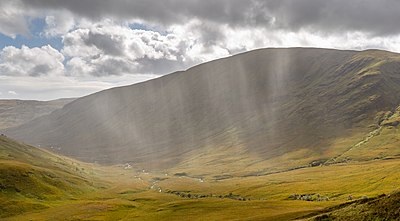 |
| Rain over a Scottish
catchment. Understanding the cycling of water
into, through, and out of catchments is a key
element of hydrology. |
Hydrology
Hydrology (from Greek: ὕδωρ, "hýdōr" meaning "water" and
λόγος, "lógos" meaning "study") is the scientific study
of the movement, distribution, and management of water
on Earth and other planets, including the water cycle,
water resources, and environmental watershed
sustainability. A practitioner of hydrology is called a
hydrologist. Hydrologists are scientists studying earth
or environmental science, civil or environmental
engineering, and physical geography. Using various
analytical methods and scientific techniques, they
collect and analyze data to help solve water related
problems such as environmental preservation, natural
disasters, and water management.
Hydrology subdivides into surface water hydrology,
groundwater hydrology (hydrogeology), and marine
hydrology. Domains of hydrology include
hydrometeorology, surface hydrology, hydrogeology,
drainage-basin management, and water quality, where
water plays the central role.
Oceanography and meteorology are not included because
water is only one of many important aspects within those
fields.
Hydrological research can inform environmental
engineering, policy, and planning. |
|
|
Hydrology subdivides into surface water hydrology,
groundwater hydrology (hydrogeology), and marine
hydrology. Domains of hydrology include
hydrometeorology, surface hydrology, hydrogeology,
drainage-basin management, and water quality, where
water plays the central role. |
|